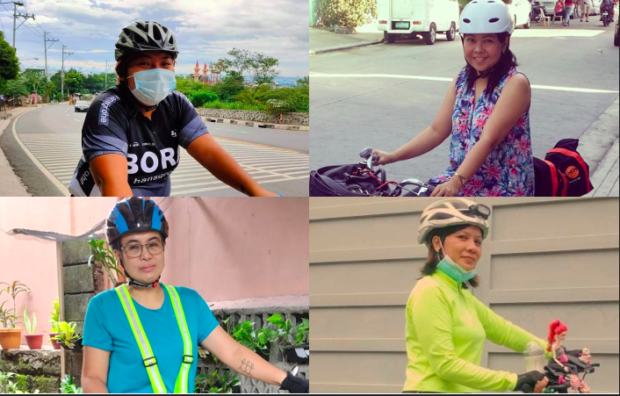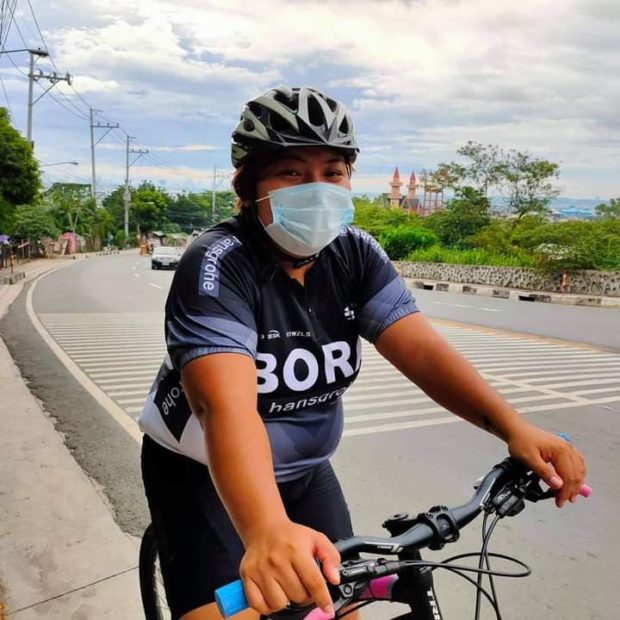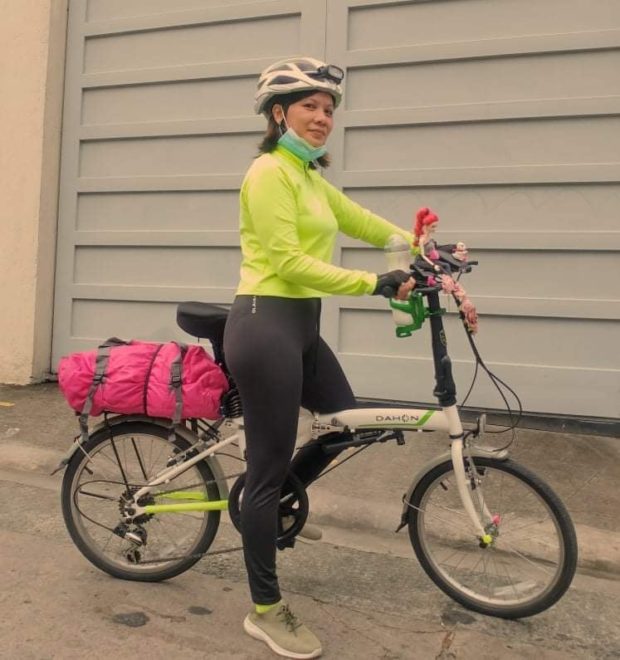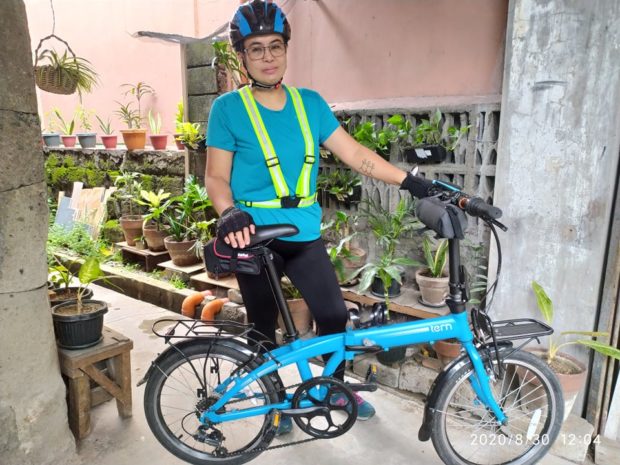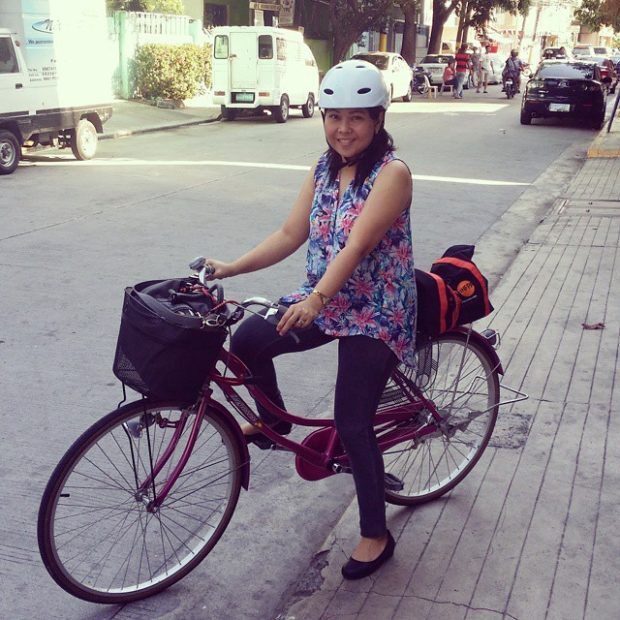Overcoming the pandemic on bikes, these Filipino women defy monsters on the road
“Bago ako sumakay, nagdadasal ako.” (Before I ride, I pray).
This is the ritual of Diana Teofilo, a home-based English teacher and biker from Cainta, Rizal, each time she has to hit the road on her bicycle.
It doesn’t matter if she’s biking to work or to the grocery store, or if she’s going on a long ride or just a quick jaunt around the city. She always prays for her safety — and for other bikers like her to get to their destinations unscathed.
“No matter how safe you try to be, there are still external factors that can happen. I hope for all of us bikers to be okay, that we get to work and go home safely,” Diana said speaking in a mix of English and Filipino.
Diana started biking to work just last January. It would usually take her two to four hours commuting from work in Bonifacio Global City, Taguig, to home to Cainta. Every day, she said, she would find herself in a rush and her temper hanging by a thread. The daily commute had made her quick-tempered and easily stressed.
Article continues after this advertisement“It was my husband who influenced me. He’s a BMX biker so he said let’s buy a bike so you’ll get exercised, too,” Diana said. “Since I started to work, because you’re tired instead of exercising, you just sleep it through,” she said.
Article continues after this advertisementMore and more Filipinos have turned to riding bicycles as an alternative mode of transportation after President Rodrigo Duterte placed Luzon and other areas on enhanced community quarantine (ECQ) last March due to the COVID-19 pandemic. The ECQ halted the operation of mass transportation, which left the riding public little choice to get to where they’re going—workers on the frontline of the COVID-19 fight and some private sector workers get shuttles or use their own vehicles.
Under modified ECQ, motorcycles, bicycles and electric scooters had already been allowed on the roads which prompted many, out of necessity, to take on the two-wheeled machine in getting around. In an Inquirer report last May 17, bike dealers and distributors reported a surge in sales during the lockdown.
Pre-pandemic, Yvonne, a credit and collection staffer, would usually take the UV Express on her commute to work from Cainta to Mandaluyong.
But when she and her colleagues were required to report for work more than three months ago, she had no choice but to turn to biking.
She had her fears as expected. Yvonne said she last rode a bike when she was still in her youth. She said she was concerned she might have already forgotten how to ride one or might have difficulty in balancing herself. She also wasn’t used to biking on the main roads.
“I was thinking, could I handle it? My friends even told me, ‘Can you do it? Because you might collapse on the road later on and I said, I don’t really have a choice,” Yvonne said in Filipino.
Divine Campos, a mother of two girls, was also compelled to switch to biking amid the pandemic. As a school nurse connected to public schools in San Mateo, Rizal, Divine began to worry about how she would get to her work should she be required to report physically after the ECQ.
She initially bought an e-bike, but twice she attempted to make a U-turn on the Marcos Highway to reach her destination—and twice she found herself unable to do it.
During these moments, Divine said she saw bicycle riders carrying their bikes on the footbridge and thought: “How fortunate are the bikers. They just had to carry their bikes, no problem.”
For two weeks, she contemplated about whether she could handle biking from Pasig to San Mateo. She then came across the Facebook page of MNL Moves, an online community that advocates for the welfare of cyclists and pedestrians in Metro Manila, and found herself interested in folding bikes.
“I sold the e-bike [then] the next day I found somebody selling folding bikes,” she said. “That’s when I started [my] biking journey.”
Pinay Bike Commuter
There are different Facebook communities dedicated to Filipina bikers, like Tropang Women Bikers and Padyak Pinay, among others. Diana, Divine and Yvonne were previously featured in posts on Padyak Pinay, which regularly spotlights Filipina bike commuters in the city.
Three months into the quarantine, Jaramia “Geri” Amarnani decided to put up the page Pinay Bike Commuter on Facebook — an online safe space dedicated to Filipina bike commuters. She also established a private Facebook group, Pinay Bike Commuter Community, with fellow bike-commuting friends that she met from MNL Moves and Karen Silva-Crisostomo.
According to Geri, she highlights the stories and testimonies of members of Pinay Bike Commuter Community on the page. She also shares infographics on biking advice based on her experience as a bike commuter and also reposts stories from other pages like Padyak Pinay and Mobile in MNL when they feature women bikers.
“It’s not a competition for me from other pages, I just want Filipina bike commuters [to] be featured so we can further inspire other women to bike,” Geri told INQUIRER.net.
“Pandemic came and a lot of women were, in a way, forced to commute via bicycle,” she added. “It’s a different take if you are forced to do something because of certain conditions (as opposed to) you want to do it. It’s heavier mentally and also physically.”
The page currently has over 3,500 followers since its conception last June and has become an enclave for Filipinas, bikers and non-bikers alike, to share their challenges and milestones in bike commuting, and encourage and be encouraged to try out biking.
For Geri, it has been almost six years since she started biking to work. Like Diana, she was inspired by her husband, who used to commute bi-modal. He would bike from home in Makati and park in Ayala before taking a bus to Parañaque where he previously worked.
“Every time he comes home, [he] would tell me about this feeling of freedom while biking. As a woman on maternity leave who is 24/7 taking care of a baby and breastfeeding, I longed so much [for] that feeling,” she said. “So, I told him I want to bike to work after my maternity leave.”
And she did. She has not stopped since.
Undisciplined motorists, lack of bike lanes, harassment
Biking in the city does not come without risks. Apart from the lack of bike lanes in some areas, bikers also have to deal with unruly and aggressive motorists. For women bikers, there is also the threat of being sexually harassed and body-shamed.
Just last Aug. 23, a nurse, Renz Jayson Perez, was riding his bicycle when he was struck by a black pickup truck at the corner of Padre Burgos and Maria Orosa Streets in Manila.
Perez was hurled to the ground due to the impact and was declared dead on arrival at the Philippine General Hospital. The driver of the vehicle at the time fled the scene, although the owner of the vehicle had surrendered to authorities last Aug. 28.
Diana told Inquirer that there were times when she had to speak up and confront drivers while biking, especially those who are stubborn in their unwillingness to share the road.
“Even if I’m in the bike lane, I still get pinned, so I’ve gotten into a fight with a driver because of that. Second, the motorcycles. Usually I don’t have a problem if we have to share the road, but the problem is motorcycles like to cut you off,” Diana said.
Cases like these are familiar among the women, who had their fair share of experiences in dealing with undisciplined motorists.
“Those in the car, PUVs and motorcycles. Majority are good drivers [but] those [who] are bad, are really bad. They shout at you, pin you, drive close to you, honk at you, harass you, sometimes sexually, like catcall you. Basically they don’t care [about] bike commuters or pedestrians,” said Geri.
As a biking advocate, Geri said she believes permanently-protected, top-quality bicycle lanes, like the ones in Denmark, should be installed in cities to make them bike-friendly.
Yvonne herself experienced being honked at by a driver of an SUV once while she was biking in Ortigas.
“It was a go signal and the car beside me honked at me so loud. I yelled, ‘You’re rude!’ because I got startled. It’s difficult when they startle you because you get outbalanced,” said Yvonne.
For Divine, it seems as if motorists do not respect bikers.
“Even pedestrians are not respected, how much more bikers?” she said. “They are supposed to share the road. Just because you’re in a motorized vehicle does not mean you’re the king of the road.”
Diana also shared her experience of being body shamed as a big woman who bikes. There are times, she said, when she would be biking and would be met with unwarranted comments from loiterers in the street.
“Hey, miss, that’s good! You’ll become sexy from biking because you’re huge’ or ‘Oh, the tire is flat because the rider is heavy.’ When that happens, I just ignore them, I don’t fight back, but sadly, that’s how it is,” said Diana.
Benefits of biking
Whatever abuses these Filipina bikers may have experienced on the road, one thing is clear: these are not enough to stop them from biking, especially when the benefits outweigh the bad stuff.
Since she started biking, Diana said she now has more time for herself, her husband and her pets. She had also lost weight, became more alert and focused, and was able to save money that she otherwise would have spent on fares.
Geri said she feels stronger and that her stamina has improved from biking. “I don’t do bike commuting to lose weight but looking at my previous pictures, I look better now,” she said. “It also saved me money. The most important thing is time! More time for my family. [In] thirty minutes, I am home.”
In Divine’s case, her eldest daughter has gotten interested in biking because of her.
“She plans to bike [as well], so she bought her own folding bike,” said Divine. “It has become a form of bonding for us every weekend. As long as she doesn’t have work, we bike together.”
Yvonne said she no longer arrives late for work, thanks to biking. It has also done wonders for her anxiety and allowed her to develop better sleeping habits. She also likes that she is able to care for the environment because biking reduces pollution.
The uninitiated may find biking daunting on the surface, but fear, in all things newly encountered, seems, more often than not, a normal response.
“Everybody experiences that, you get scared at first, but as time passes you build up your confidence,” advised Divine. “They won’t know until they try it out. They can start first on streets in their neighborhood then eventually they’ll go out on the road.”
Diana added that women on the heavy side should not be bothered if they ever get discouraged from trying out biking.
“This is one good exercise because I already experienced it, so this is good for our bodies,” she said. “If they are told they’re fat or they are subjected to body-shaming, so what? Don’t pay attention to those. Biking is for everybody, biking is open for everybody.” WITH REPORTS FROM KRIXIA SUBINGSUBING AND NIKKA G. VALENZUELA
TSB
